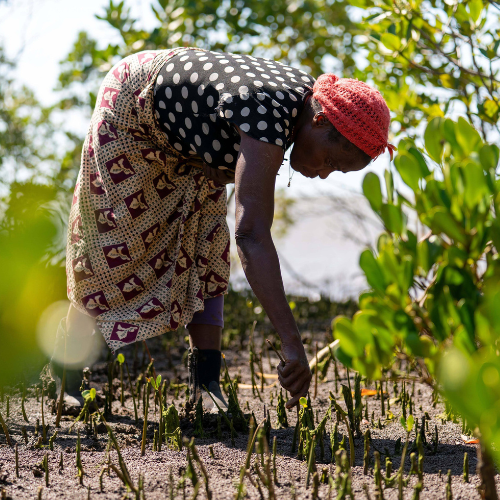Hey there, I thought I would just point out some key facts as to why I think it is important that we teach our future generations the benefits of making conscious decisions in what they are buying right down to what they eat. I was never brought up educated on the way food was mass produced right down to what we wear on our bodies. I became aware of this throughout my life, and it was not until my early 20’s I started turning to basically 99% organic food and sourcing clothing which was made sustainably. I have purchased all my food from the local markets for almost 10 years now and because of this I have made great relationships with local farmers while also supporting them and our local communities. The local markets I shop at have grown produce year after year which is beautiful to see.
What are the Benefits of a Sustainable Lifestyle?
Saves Money
Even if some people (rather selfishly) don't care about environmental sustainability, we all surely care about our bank balance. So, the good news is that leading a more sustainable lifestyle is good for your wallet as well as for the planet.
Here are some ways in which sustainable habits can save you money.
- You'll get permanently lower utility bills when you reduce your energy consumption and water usage.
- Or you could eliminate your bills entirely by using renewable energy sources such as solar panels in your home.
- Pay less for groceries when you eliminate food waste and only buy what you need. Shop at local farmers' markets to buy cheaper healthier food without disposable packaging,
- If you have the space at your home grow some veges, Herbs require very little space to grow and a usually the most wasted source of food when purchased in bunches.
Although money shouldn't be the main motivator here, it does make great financial sense to live sustainably. With just a few changes, the savings can really add up.
Improves Your Health
Many people experience improved health after making the transition to sustainable living. A cleaner home with low expenses is good for your wallet, and a cleaner planet is also good for your body in several ways:
- Air pollution kills millions of people every year. Better air quality in our towns and cities means you breathe in fewer toxic pollutants.
- You'll improve your diet by cutting down on red meats and processed foods and eating more sustainable food.
- Get more exercise, lose weight, and help your heart by walking or cycling more often.
- Plastic waste gets into our food chain and drinking water. Switch to sustainable water bottle and reusable bags, and there's less chance of your plastic waste ending up in your dinner.
So, if you truly value your health, it's pretty obvious that a sustainable lifestyle has many health benefits both now and in the future.
Saves the Environment
The lifestyle we live today, and have been living for the past half-century, has had a catastrophic environmental impact. This needs to be stopped now if the planet is to have any chance to recover.
Sustainable living means that future generations can continue to enjoy nature and all its benefits.
- Reduce the environmental damage caused by plastic pollution by saying no to plastic bags and bottles.
- Fight climate change by reducing our carbon footprint and greenhouse gas emissions.
- Reduce the impact on our lakes, rivers, and oceans by consuming less water and releasing fewer harmful chemicals into the water you do use.
- Stop the destruction of natural habitats.
Put simply, living sustainably is the only way that we can give our planet and our species a chance to survive in the long term.
Are Sustainable Practices More Expensive?
Sustainable living is not more expensive it just requires some changes in the way we live.
Some people will say that sustainable lifestyles will result in higher costs, but in many cases the opposite is true.
Often, when you buy "green" products, even if the upfront cost is higher, you save money in the long term.
- For example, LED light bulbs use up to 90% less energy than traditional bulbs and last up to 25 times longer. This means you don't have to buy replacement light bulbs so often. And because LED light bulbs use less energy, your monthly energy bills are reduced.
- Another example of how sustainable living can reduce your expenses is seen in heating and cooling your home. When you invest in insulation for your home, this will result in lower heat and air conditioning costs during the summer and winter months which can reduce heating and cooling bills by 20%-50%.
It is true that some eco-friendly products such as eco friendly apparel can appear more expensive.
This is because they aren't mass-produced, so they cost more to make. But mass production by big brands often causes the most damage to the environment.
- Why are sustainable products more expensive and are they worth it?
Also, the more people switch to eco-friendly brands that promote sustainability, the cheaper they'll get.
How to Start Your Sustainable Lifestyle Today?
- Drive less. Walk, cycle or take public transport whenever possible.
- Shop local. Goods and foods carry a carbon footprint whenever they are transported. Plus, the health benefits of locally grown food are massive. Organic food at local markets won’t cost much more than shopping at let’s say a supermarket chain.
- Buy less stuff! Don't be wasteful, only buy what you need. Buy used secondhand products when you can. Facebook marketplace is excellent for this.
- Stop buying single use products. Reuse whenever possible and buy compostable or recyclable products if they can't be reused. Use your own shopping bags to reduce plastic waste.
- Don't skimp on the recycling! Always put your trash in the right bins.
These are the steps we need to take to live sustainably, and it doesn't need to be hard. When future generations look back at our time, they will either see us as the generation that ruined the planet or saved it.
What we should be doing now is educating our next generation to follow in our footsteps which should be to care for our home.



